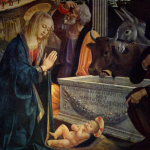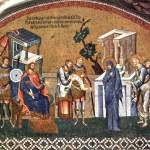Is This Mention of Jesus a Forgery?
by Jon Sorensen
Filed under Historicity
Many skeptics assert that there is no early, non-Christian evidence for a historical Jesus. But Christian apologists point to the writings of the ancient Jewish historian Josephus, who mentions Jesus no less than twice. Yet are those accounts truly trustworthy?
Who was Josephus?
Josephus was born to a wealthy family in Judea in the year A.D. 37. In the year 66, a national revolt against Rome broke out and Josephus was appointed commander of the insurgent forces in Galilee. The resistance was crushed in the summer of 67, and he was brought before Vespasian, the Roman general charged with suppressing the revolt. Josephus predicted that Vespasian would become emperor one day, and so his life was spared, but he was kept prisoner until two years later when the prophecy came true.
After defecting to the Roman side, Josephus became an adviser to Vespasian's son, Titus. He later recorded Jewish history, especially from the first century.
Where Does Josephus Mention Jesus in His Writings?
In his historical work Antiquities of the Jews, Josephus writes that the Roman procurator of Judea died suddenly in A.D. 62. During a three month interregnum period, Annas the younger, son of Annas who is mentioned in Luke 3:2, John 18:3, and Acts 4:6, is appointed high priest and orders the stoning of lawbreakers:
"[H]e convened a judicial session of the Sanhedrin and brought before it the brother of Jesus the so-called Christ—James by name—and some others, whom he charged with breaking the law and handed them over to be stoned to death." (Josephus, Antiquities, book 20)
This James was probably James the Just, whom St. Paul describes as “James, the brother of the Lord” (Gal.1:19). An overwhelming majority of scholars believe that this passage is authentic, but there is another mention of Jesus in Antiquities known as the Testimonium Flavianumthat many are divided on:
"Now there was about this time Jesus, a wise man, if it be lawful to call him a man; for he was a doer of wonderful works, a teacher of such men as receive the truth with pleasure. He drew over to him both many of the Jews and many of the Gentiles. He was [the] Christ. And when Pilate, at the suggestion of the principal men amongst us, had condemned him to the cross, those that loved him at the first did not forsake him; for he appeared to them alive again the third day; as the divine prophets had foretold these and ten thousand other wonderful things concerning him. And the tribe of Christians, so named from him, are not extinct at this day." (Antiquities, Book 18)
Josephus was certainly not a Christian, and so it is unlikely that he would have used phrases like, “if it be lawful to call him a man,” or “he was the Christ.” The majority of scholars of early Judaism and experts on the writings of Josephus believe this was likely touched-up by Christian scribes at a later time. Instead, the passage probably read like this:
"Now, there was about this time Jesus, a wise man; for he was a doer of wonderful works, a teacher of such men as receive the truth with pleasure. He drew over to him both many of the Jews and many of the Gentiles. And when Pilate, at the suggestion of the principle men among us, had condemned him to the cross, those that loved him at the first ceased not so to do; and the race of Christians, so named from him, are not extinct even now." (J. Klausner,Jesus of Nazareth, pg 55)
What to Make of the Testimonium Flavianum?
Many skeptics argue that Jospehus actually made no references to Jesus at all, and that both mentions of him were added by Christians. According to them, if the Testimonium Flavianum were removed from the text, the paragraph preceding it and the one after it flow together well. This argument is weak, however, because ancient writers would often wander from their main points. Antiquities itself contains many such digressions.
Another common skeptical claim is that no Christian authors seem to be aware of either passage until early Church historian Eusebius mentions it in the fourth century. For example, second-century theologian Origen quotes Josephus freely in his writing Contra Celsus, but, as atheist Dan Barker writes, “[He] never once used this paragraph, which would have been the ultimate ace up his sleeve” (Godless, pg 255). However, given the nature of the pagan accusations against Jesus (that he was born out of wedlock, died shamefully, etc.), there is nothing in the shortened version of the Testimonium that would have aided the arguments of the early Christian apologists. Thus we would not expect them to quote it, especially since Jesus' existence was not in question.
Whether the surviving quotes contain Christian interpolations or not, the scholarly consensus is that Josephus did indeed know something of an obscure teacher named Jesus. What we are left with is a non-Christian account that backs up at least three main points about him: Jesus existed, he started the Christian movement, and he was crucified under Pontius Pilate.
Related Posts
Note: Our goal is to cultivate serious and respectful dialogue. While it's OK to disagree—even encouraged!—any snarky, offensive, or off-topic comments will be deleted. Before commenting please read the Commenting Rules and Tips. If you're having trouble commenting, read the Commenting Instructions.













